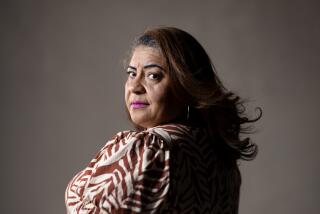Portrait of the New National PTA President
- Share via
WASHINGTON — Ann Kahn of Fairfax, Va., who took office Tuesday as president of the National PTA, is making it clear: “If there are schools out there that would still prefer someone who just raises money, then they are going to have trouble with the current PTA.”
Before her children were born, Kahn, 58, a former three-time chairman of the school board of Fairfax, the nation’s 10th largest school system, was a salaried national executive staff member for the League of Women Voters, an organization she admires for its “gutsiness.”
This is a woman who took the chairmanship of the religious education committee at her synagogue because she thought she could help turn things around: “Religious education had become extremely boring and most children hated it.”
And she has expectations for the 5.6-million-member PTA that have little to do with bake sales and stitchery boutiques. Kahn is talking instead about things like lobbying for funding for latchkey children, equal time to respond to beer advertisements on radio and television and finding ways of involving inner-city parents, of “bringing PTA back into the urban centers,” where, she said, “the need is enormous.”
PTA, Kahn noted, started as a child advocacy organization 88 years ago and “that’s where we are today. There may have been periods of time when some PTAs found their role reduced to that of banker” but today, she said, “schools need us” if they are going to “begin to teach to the 21st Century instead of back to the 19th.”
Kahn is atypical of past PTA national presidents, who traditionally have begun as volunteers at the school unit level and slowly climbed the ladder of state, regional and national offices. Although she joined a Fairfax PTA when her daughter Nancy, now 29, was a first-grader, she never was a state officer.
“My involvement took a totally different twist,” Kahn said, recalling an out-of-the-blue telephone call from the national president in 1963, asking if she would serve as a volunteer on the Legislative Service Committee, PTA’s lobbying arm in Washington.
“I have no idea how my name came up,” she said. When the caller identified herself as national president of the PTA, Kahn thought, “Oh, sure you are.”
But she took the post and she “got absolutely hooked on legislative work.” She served 18 years on that committee, 10 years as its chairman. In 1976 she was elected national secretary and, in 1983, first vice president of National PTA. Kahn is divorced. Her daughter, Nancy Kahn Bolash, is a prosecuting attorney for the commonwealth of Virginia. Her son David, 26, has a Ph.D in biochemistry and will be doing post-doctoral research in brain chemistry at the University of North Carolina.
Daughter of Polish Immigrants
Both were educated in the Virginia public schools. Kahn, the daughter of Polish immigrants, said, “I am a first-generation American and my first concern is the preservation and enhancement of the public schools. I think they do very well for a great many people.”
To do that, she said, means addressing both educational and other issues, among the latter “the changing American family. We must try to help parents be better parents” whether they are part of a traditional family or are a two-career couple or single parents.
“I don’t think we’re here to make judgments,” Kahn said. “It’s a fact of life. Our obligation is to change the way we operate to better help those families to cope with parenting. We can’t have the same type of meetings for parents whose time is eaten up by just being alive.”
PTA won’t reach those people, she said, with a “let’s all come to the (school) cafeteria and talk about things” invitation. “There’s not that much time left over for women who are working at things that are tough and tiring and demanding.” Rather, she said, they should be offered an opportunity to “walk up the street to a meeting in someone’s family room.”
On a Changing Society
She said: “More than half of our national board is now composed of people who are working--and they’re going to be willing to provide assistance to people like themselves.”
Reflecting the changing society, she added: “A great many of our resolutions (that came before the convention this week) have to do with health and safety” of children. National PTA publications also have focused on these issues. One instructs children in how to answer a telephone without indicating that no adult is at home, another is a guide to extremist groups.
Kahn described National PTA as “a very issue-oriented organization,” but not a political one--”There is no Republican or Democratic way that defines the best education for a child. We’re for and against both parties, depending on what the issues are.” One issue the organization embraced was passage of the uniform minimum 21 drinking age law.
While “not out there with a vendetta against the schools,” Kahn said, PTA members are playing the watchdog role. She told of a PTA member in Fairfax County, Va., where parents serve on committees that evaluate textbooks, discovering that Scott, Foresman & Co., the textbook publisher, “had removed from Romeo and Juliet anything they thought might be offensive.”
Because Marlene Blum spoke out, Kahn said, “The entire state of Virginia has made it known that we would not accept that tinkering with William Shakespeare, that we wanted (the students) to learn it as Shakespeare liked it, not as Scott, Foresman liked it.”
Sometimes PTA appears to “discover” an issue long after everyone else has (this year’s convention workshops, for example, included missing children, teen suicides, child abuse, drinking and driving).
Some Issues ‘Not Flashy’
Kahn said this was not an indication that PTA is less than aggressive in identifying issues but, rather, that “some issues in education are not flashy. Some we have to stick with years and years to accomplish anything. Our issues are issues that are not resolved.”
She observed: “Most things that are happening are the chipping away rather than the revolutionary. There’s just too many people out there who can stop that kind of revolution.”
Kahn begins a two-year term as president at what she calls “the opportune moment” as a result of a renewed public interest in, and confidence in, public education that is being reflected in state budgets. “The trend is not down,” she said. “It is up.”
Also on the upswing is PTA’s national membership, which reached a “baby boom” high of 12 million in the early 1960s but steadily declined to fewer than 5.3 million before it again began rising three years ago. PTA, coming back, will be working, said Kahn, to “upgrade both the image and the quality of the teaching professions.” It can happen, she said, but “we’re going to have to get the money to back it up.”
More to Read
Sign up for Essential California
The most important California stories and recommendations in your inbox every morning.
You may occasionally receive promotional content from the Los Angeles Times.













